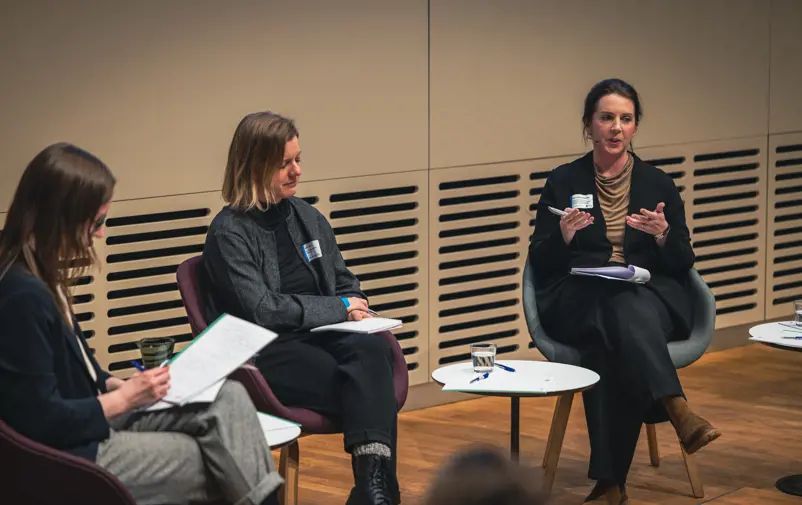
FBA's International Research Working Groups form an important part of the agency's evidence-based approach. From left: Mathilda Lindgren, FBA; Corinne Bara, researcher; Sara Lindberg Bromley, researcher.
Initially the project caused surprise. Corruption is widespread in Ukraine, and people have little confidence in public institutions. Few understood why civil servants should spend time on matters regarding rule of law.
– I have seen a tremendous change in people’s attitudes and insights. From ‘why do we talk about this’ to rule of law becoming a natural part of the authorities’ work, that contributes to increased transparency and accessibility, says Julia Sedyk, who coordinates FBA’s work in Kyiv.
The project was launched in 2015. The participants, from 15 different Ukrainian municipalities, have learned useful methods for improving their work in order to meet the needs of the citizens, according to a survey at the end of the project. Several of the participants emphasize the importance of meeting others who face the same challenges, to discuss and share solutions.
– There are positive results, in particular at the local level. The project has changed our partner’s view of their own role as executors of power, and their concrete work procedures. Many participants emphasize that the combination of activities, including opinion polls, trainings and peer-to-peer gatherings, was successful, says Emma Öståker, Project Manager for FBA’s work in Ukraine.
The positive image is confirmed in a new evaluation, carried out by the consulting group FCG Sweden. They deem that the project has been relevant in the country context, as well as in terms of the Swedish development cooperation priorities.
Through the network that has been established, FBA’s partners will be able to support each other in the continuous work for more transparent and legally certain public service in Ukraine, when this part of the project is being phased out.
Democracy and human rights are priority areas for Sweden’s development cooperation with Ukraine. Sweden also supports decentralization efforts in Ukraine; a transfer of power from central to local government.
– The decentralization reform is crucial for Ukraine’s democratization and modernization, in order to strengthen the position of the municipalities so that they can create an efficient administration based on the rule of law, says Jakob Hedenskog, Deputy Research Director at the Swedish Defence Research Agency (FOI) and co-author of a report on Ukraine’s economic reforms.
In addition, researchers from Kyiv-Mohyla Academy have studied access to public service in the occupied territories in eastern Ukraine and on the Crimean peninsula. The report, carried out within the framework of FBA’s project, concludes that people living in the non-government controlled areas experience difficulties claiming their rights as citizens.
In a conflict situation the rule of law is brought to a head and human rights are under fire.
– A dysfunctional state that fails to cater to the citizen’s needs risks augmenting mistrust and tensions and thereby prolonging the conflict, Emma Öståker explains.
Therefore, FBA’s further work in Ukraine will focus on rule of law related issues in connection to the ongoing conflict, whilst securing sustainability and dissemination of achieved results.
The whole country is affected by the conflict with Russia. More than one and a half million people have been forced to leave their homes. Many have had their property destroyed as a result of the fighting, without being compensated for their loss.
Even a small city like Dolyna with 25,000 inhabitants in western Ukraine hosts some hundred internally displaced people (IDPs) and returning war veterans. Post-traumatic stress is common. Due to outdated legislation, the IDPs do not enjoy civil liberties and fundamental human rights.
It is also hard for the inhabitants in the eastern part of the country, that is beyond government control, to access basic services needed for everyday life.
In order to go to school or obtain retirement benefits one has to be registered with the authorities but the Ukrainian government does not accept documents that have been issued on the non-government controlled side.
It means that those who live there and want a passport have to cross the contact line to get to the government controlled side – but crossing the contact line is only possible with a Ukrainan passport. It is a circle that cannot be squared.
Blog post by FBA's Ludmila Ceban on the recent events in Ukraine.
Photo: Ivan Bandura
MORE FROM HOME
Participating in FBA’s International Research Working Groups offers a unique opportunity for researchers to contribute to the work for peace, security, and development. The thematic scope is now expanding with five new groups, inviting interested scholars from around the world to apply.
2025-03-13 16:49FBA has both increased and adapted its work in Ukraine in the wake of Russia's invasion.
FBA in UkraineKlara Grenhagen works as a specialist at FBA's Africa unit with a focus on dialogue, reconciliation and peace processes.
More about our expertsFBA is part of Sweden’s development aid within the area of peace and security
Read more about the countries where we work